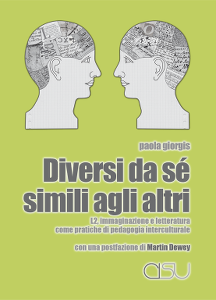Giorgis Paola
Different from Oneself, Similar to Others.
L2, Literature & Imagination as Practices of Intercultural Education
Roma (2013): CISU. pp. 268 - ISBN 9788879755863
Book abstract

The study investigates a series of questions connected to language, L2 (non-mother tongue) and identity in the perspective of Linguistic Anthropology, Intercultural Education, Interactional Linguistics and Critical Linguistics and Pedagogy.
Advancing that the experience of an L2 can reframe individual and collective identities, the study examines cross-linguistic interactions among young people, suggesting that while persisting narratives define “différence” as deviation from the norm (Abdallah-Pretceille 2005:11-21) and thus as a fixed category, bottom-up appropriation of L2s and practices of cross-linguistic interactions between adolescents and young people (Rampton 1995; Auer 2007) offer the opportunity for performing varieties of “diversités” (Abdallah-Pretceille ib.). Reshaping individual and collective identities, these practices can facilitate intercultural encounters and create a “third place” (Kramsch 1993) for inter- and transcultural affiliations.
A specific section is dedicated to the EFL (English as a Foreign Language)/ELF (English as a Lingua Franca) debate. Informed and constantly changed by many different languages and cultures, ELF is here observed both critically, considering its impact at a macro and micro level, and pedagogically, considering how evident is the dichotomy between formal instruction and informal use of the language, due to the widespread and global usage of English-es.
On the grounds of Iser’s “literary anthropology” (1989) and Nussbaum’s “literary imagination” (1995), the volume also analyses what could be called ‘Applied Literary Criticism in L2’, as it examines the experience of the literary text in L2, and in particular of Poetry in L2, as an open space for a renewed imagination able to disclose one’s emotions and empathize with others’, in a way less conditioned by memories and (self-appointed or given) roles connected to one’s linguacultural background.
The research thus view language education and use as lenses to observe intercultural dynamics, combining theoretical and practical perspectives, likewise micro and macro contexts, considering all these elements as deeply interconnected and mutually informing factors. The research was conducted according to a quali-quantitative methodology based on the observation of linguistic interactions, on linguistic questionnaires, and audio-recording of back-talk focus groups.
The book is written in Italian, with quotes in English an French maintained in the original languages. The volume also includes an Introduction (in Italian) by Francesca Gobbo, former Professor of Anthropology of Education and Intercultural Education, University of Turin, Italy, who reflects on the connections between literary imagination, languages and interculture, and an Afterword (in English) by Martin Dewey, Senior Lecturer in Applied Linguistics, King’s College, London, UK, who has been working for years on globalization and interculture, and here discusses uses and practices of ELF in the pedagogical context.
The book has been presented in several occasions, and it was well received in intercultural centres, as well as in national and international newspapers and reviews (see for example: ELT Journal, Volume 69/3 July 2015, Oxford University Press: 327-330 - http://eltj.oxfordjournals.org/content/early/2015/05/14/elt.ccv025).
Key words: L2, critical linguistics and pedagogy, intercultural education, language & identity, literature in L2
Link: link to the publisher

